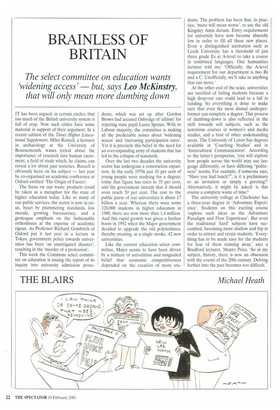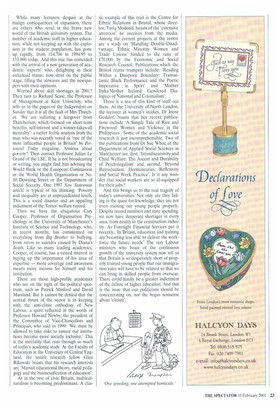BRAINLESS OF BRITAIN
The select committee on education wants
'widening access' — but, says Leo McKinstry,
that will only mean more dumbing down
IT has been argued, in certain circles, that too much of the British university system is full of crap. Now such critics have some material in support of their argument. In a recent edition of the Times Higher Educational Supplement, Miles Russell, a lecturer in archaeology at the University of Bournemouth, waxes lyrical about the importance of research into human excrement, a field of study which, he claims, can reveal a lot about past societies. Russell is obviously keen on his subject — last year he co-organised an academic conference at Oxford entitled 'The Origin of Faeces'.
The focus on our waste products could be taken as a metaphor for the state of higher education today. Like so many of our public services, the sector is now in crisis, beset by plummeting standards, low morale, growing bureaucracy, and a grotesque emphasis on the fashionable orthodoxies at the expense of academic rigour. As Professor Richard Gombrich of Oxford put it last year in a lecture in Tokyo, government policy towards universities has been 'an unmitigated disaster', resulting in the 'murder of a profession'.
This week the Commons select committee on education is issuing the report of its inquiry into university admission proce dures, which was set up after Gordon Brown had accused Oxbridge of 'elitism' for rejecting state pupil Laura Spence. With its Labour majority, the committee is making all the predictable noises about 'widening access' and 'increasing participation rates'. Yet it is precisely this belief in the need for an ever-expanding army of students that has led to the collapse of standards.
Over the last two decades the university sector has undergone a remorseless expansion. In the early 1970s just 10 per cent of young people were studying for a degree; today that figure has risen to 35 per cent, and the government intends that it should soon reach 50 per cent. The cost to the public purse of our universities is about .€7 billion a year. Whereas there were some 320,000 students in higher education in 1980, there are now more than 1.4 million. And this rapid growth was given a further boost in 1992 when the Major government decided to upgrade the old polytechnics, thereby creating, at a single stroke, 42 new universities.
Like the current education select committee, Major seems to have been driven by a mixture of anti-elitism and misguided belief that economic competitiveness depended on the creation of more stu dents. The problem has been that, in practice, 'more will mean worse', to use the old Kingsley Amis dictum. Entry requirements for university have now become absurdly low in order to fill all these new places. Even a distinguished institution such as Leeds University has a threshold of just three grade Es at A-level to take a course in combined languages. One humanities lecturer told me: 'Officially, the A-level requirement for our department is two Bs and a C. Unofficially, we'll take in anything that can move.'
At the other end of the scale, universities are terrified of failing students because a high drop-out rate could lead to a fall in funding. So everything is done to make sure that even the most dismal underperformer can complete a degree. This process of dumbing-down is also reflected in the shift towards soft subjects, such as the notorious courses in women's and media studies, and a host of other undemanding areas. The University of Luton has degrees available in 'Coaching Studies' and in 'Intercultural Communication'. According to the latter's prospectus, 'you will explore how people across the world may use language differently, or have differing "politeness" norms. For example, if someone says, "Have you had lunch?", is it a preliminary to an invitation or simply a greeting?' Alternatively, it might be asked: is this course a complete waste of time?
The university college at Chichester has a three-year degree in 'Adventure Experience'. Students on this exciting course 'explore such ideas as the Adventure Paradigm and Flow Experience'. But even the traditional 'hard' subjects have succumbed, becoming more shallow and hip in order to attract and retain students. 'Everything has to be made easy for the students for fear of them running away,' says a Bradford lecturer, Munro Price. `So in my subject, history, there is now an obsession with the events of the 20th century. Delving further into the past becomes too difficult.' While many lecturers despair at the malign consequences of expansion, there are others who revel in the brave new world of the British university system. The number of academic staff in higher education, while not keeping up with the explosion in the student population, has gone up rapidly, from 114,700 in 1994/95 to 133,000 today. And this rise has coincided with the arrival of a new generation of academic 'experts' who, delighting in their enhanced status, now strut on the public stage, filling the airwaves and the newspapers with their opinions.
Worried about skill shortages in 2001? Then turn to Richard Scase, the Professor of Management at Kent University, who tells us in the pages of the Independent on Sunday that it is all the fault of Mrs Thatcher. We are suffering a hangover from Thatcherism, which focused on short-term benefits, self-interest and a winner-takes-all mentality': a rather feeble analysis from the man who was recently voted as 'one of the most influential people in Britain' by Personnel Today magazine. Anxious about poverty? Then contact Professor Julian Le Grand of the LSE, If he is not broadcasting or writing, you might find him advising the World Bank or the European Commission or the World Health Organisation or No. 10 Downing Street or the Department of Social Security. One 1997 New Statesman article is typical of his thinking: 'Poverty and inequality are at unprecedented levels. This is a social disaster and an appalling indictment of the Tories' welfare record.'
Then we have the ubiquitous Cary Cooper, Professor of Organisation Psychology at the University of Manchester's Institute of Science and Technology, who, in recent months, has commented on everything from Big Brother to bullying, from stress to suicides caused by Diana's death. Like so many leading academics, Cooper, of course, has a vested interest in hyping up the importance of his area of expertise — more coverage and awareness means more income for himself and his institution, There are those high-profile academics who are on the right of the political spectrum, such as Patrick Minford and David Marsland. But it cannot be denied that the central thrust of the sector is in keeping with the anti-elitist orthodoxy of New Labour. a spirit reflected in the words of Professor Howard Newby, the president of the Committee of Vice-Chancellors and Principals, who said in 1999: We must be allowed to take risks to ensure our institutions become more socially inclusive.' This is the mentality that runs through so much of today's academic study. At the Faculty of Education at the University of Central England, the senior research fellow Glen Rikowski boasts that his research interests are 'Marxist educational theory, racial pedagogy and the businessification of education'.
As in the rest of civic Britain, multiculturalism is becoming predominant. A clas
sic example of this trait is the Centre for Ethnic Relations in Bristol, whose director, Tariq Modood, boasts of the 'extensive attention' he receives from the media. Among the current projects at the centre are a study on 'Handling Double-Disadvantage, Ethnic Minority Women and Trade Unions' funded to the tune of £70,000 by the Economic and Social Research Council. Publications which the Bristol centre trumpets include: 'Reading Within a Diasporic Boundary: Transatlantic Black Performance and the Poetic Imperative in Sport' and 'Mother India/Mother Ireland: Gendered Dialogues of National and Colonialism'.
There is a sea of this kind of stuff out there. At the University of North London, the lecturer in women's studies, Dr Irene Gedalof, boasts that her recent publications include 'A Simple Tale of Rice and Firewood: Women and Violence in the Philippines'. Some of the academic social research is just incomprehensible. Two of the publications from Dr Sue White of the Department of Applied Social Sciences in Manchester are, first, Interdiscursivity and Child Welfare: The Ascent and Durability of Psycholegalism' and, second, 'Beyond Retroduction: Hermeneutics, Reflexivity and Social Work Practice'. Is it any wonder that social workers are so ill-equipped for their jobs?
And this brings us to the real tragedy of today's universities. Not only are they failing in the quest for knowledge, they are not even training our young people properly. Despite record numbers and state spending, we now have desperate shortages in every area, from health to the construction industry. As Foresight Financial Services put it recently, 'In Britain, education and training are becoming less able to deliver the workforce the future needs.' The very Labour ministers who boast of the continuous growth of the university system now tell us that Britain is so desperately short of properly trained young people that our immigration rules will have to be relaxed so that we can bring in skilled people from overseas. There could hardly be a greater indictment of the failure of higher education. And that is the issue that our politicians should be concentrating on, not the bogus nonsense about 'elitism'.



































































 Previous page
Previous page